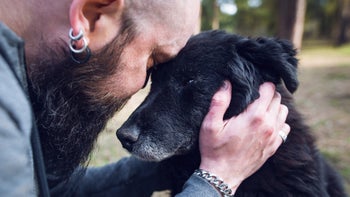
Dog Diarrhea: Why It Happens, and How to Stop It
Key takeaways:
Diarrhea is common in dogs, but there are steps you can take to help prevent it.
Depending on its severity, there are several at-home remedies you can try to manage your dog’s diarrhea.
Diarrhea can quickly lead to dehydration, so it’s important to recognize when the condition becomes serious so you can get your dog the veterinary help they need.
Table of contents

Chances are that your dog will deal with diarrhea at least a few times in their life. That means you’ve probably found yourself cleaning up if your dog doesn’t make it out the door in time. While diarrhea is relatively common in dogs, it’s not fun for you or your pup.
While you might not be able to prevent diarrhea, understanding its causes and treatments can help you reduce your dog’s chances of getting it. Here’s what you need to know.
What causes diarrhea in dogs?
Diarrhea occurs when food and water pass through your dog’s gastrointestinal tract too quickly.
Search and compare options
Sara Ochoa, DVM, a veterinarian at Animal Hospital of West Monroe in Louisiana, said that there are many common causes of diarrhea in dogs. These can include:
Pancreatitis (inflammation of the pancreas)
Gastroenteritis (infection and/or inflammation of the digestive system)
Eating foreign objects, such as socks
Eating human food
Stress
What can cause bloody diarrhea in dogs?
There are many causes of bloody diarrhea in dogs. These can include:
Foreign object in the digestive tract
Tumor
Ulcer
Harmful bacteria in the gut
Ochoa said that bloody diarrhea isn’t necessarily a reason to panic. If your dog has just a small speck of blood in their stool but otherwise acts normally, don’t be alarmed. Start by monitoring your dog.
“If your dog’s diarrhea is very bloody or looks like strawberry jam, these are signs for alarm, and your dog needs to see a vet soon,” Ochoa said.
When is your dog’s diarrhea an emergency?
Your dog’s diarrhea could improve on its own in just a day or two. They may need to go outside more often than usual but should otherwise behave normally.
Remedy for the runs: Imodium is a human medication that can be given to dogs to treat diarrhea. But first, talk to your veterinarian to learn the proper dosage.
Toxic troubles: If your dog eats something harmful, an emergency clinic may treat them with activated charcoal to reduce the risk of toxicity.
Quill attack: Read how these pet parents took care of their dogs after they wrestled a porcupine. It was touch and go for one of their pups.
Other cases of diarrhea can be more serious and need veterinary attention. If you see any of the following symptoms, it’s time to get your dog to the vet:
Very watery diarrhea that doesn’t improve within a day
Diarrhea that’s very bloody or has lots of mucous
Unusually dark stool
Vomiting and diarrhea
Weight loss
Lethargy (moving slower or having less energy than usual)
Dehydration
If diarrhea occurs in puppies, it’s always concerning and worth calling your vet. It’s also important to be cautious if your senior dog gets diarrhea, since it could indicate an underlying health issue.
Read more like this
Explore these related articles, suggested for readers like you.
How to treat diarrhea in dogs and puppies
Treatment for diarrhea in dogs depends on the cause and whether it’s acute (lasts less than 14 days) or chronic (persists for over 14 days).
Treatment for acute diarrhea
Treatment for sudden diarrhea in dogs that lasts under 2 weeks might involve:
No food for 6 to 12 hours, followed by frequent smaller meals
Bland diet
Deworming
Probiotics
Medication
High-fiber diet
Fluid therapy
Rest
Diagnosis and treatment for chronic diarrhea
If your dog experiences ongoing diarrhea, they need to see a vet. Diarrhea can quickly dehydrate dogs, especially young puppies. Your veterinarian will work to diagnose the cause of your dog’s diarrhea to treat it properly. To make a diagnosis, your vet may:
Perform a fecal exam to look for parasites
Test your dog for infectious diseases
Do an X-ray or ultrasound to look for a foreign body
Run bloodwork to check for other health issues
Your vet may then recommend the following treatment for dogs with chronic diarrhea that persists for over 2 weeks:
Change in diet
Antimicrobial medications
Steroids such as prednisone or prednisolone
Immunosuppressive medications, such as cyclosporine or chlorambucil
Home remedies for diarrhea in dogs
Depending on the cause and severity of your dog’s diarrhea, you may be able to treat it at home.
Consider fasting your dog by withholding food for 12 to 24 hours. Then, feed your dog a bland diet to give their digestive tract a chance to recover. Common bland diets include cooked white rice paired with boiled chicken or low-fat hamburger. If your dog is allergic to these foods, then avoid feeding them a bland diet.
If your dog’s diarrhea began after a sudden diet change, try feeding them the original food again. That may be enough to prevent additional stomach upset. Continue feeding your dog the original food until their stools have firmed up. Then, you can start to transition your dog to a new food at a slow pace.
It’s best to spread any food transition out over 1 or 2 weeks, gradually feeding your dog more of the new food and less of the original food. This approach gives your dog’s digestive system a chance to adjust, which helps prevent diarrhea.
Giving your dog probiotics may also help shorten the duration of their diarrhea. Ask your vet for a recommendation on how to choose the right probiotic for your dog.
Preventing dog diarrhea
It’s important to avoid sudden diet changes, which can upset your dog’s stomach. You can also help prevent diarrhea by keeping your dog up to date on essential care, including parasite prevention and vaccines.
Ochoa said that dogs who tend to get diarrhea may benefit from a sensitive-stomach diet. And you should limit your dog’s access to any other types of food.
“You can also make sure that your dog is not getting access to human foods,” she said. Check that your garbage is secure, and avoid feeding them table scraps, especially fatty, spicy, or creamy foods.
Frequently asked questions
If nothing seems to work for your dog’s diarrhea, it could be a sign that the main cause has not been diagnosed correctly. In this situation, it’s best to go back to the vet and ask them to re-examine your dog. You can also take your dog to an animal hospital or another vet for a second opinion.
A mild case of diarrhea in a dog should only last for 2 days. If your dog has diarrhea for more than 2 days, it’s time to call your veterinarian for a proper diagnosis and to discuss treatment options.
The bottom line
Hopefully, you don’t have to worry about treating diarrhea in your dog too often. Still, it’s likely that your dog will have at least a few bouts of diarrhea during their lifetime. You may be able to try at-home remedies, including a bland diet.
But it’s also important to get your dog veterinary attention if their diarrhea doesn’t improve within 24 to 48 hours. Also, seek veterinary care right away if your dog has additional symptoms, such as very bloody diarrhea or diarrhea paired with vomiting. With the right care, most bouts of diarrhea will resolve, and your dog will be back to feeling like themself again.
Why trust our experts?



References
Animal and Plant Health Inspection Service. (2021). Intestinal parasites in dogs. U.S. Department of Agriculture.
Armstrong, P. J. (2013). GI intervention approach to diagnosis and therapy of the patient with acute diarrhea. Today’s Veterinary Practice.
Brooks, W. (2023). Acute hemorrhagic diarrhea syndrome (ADHS or HGE). Veterinary Partner.
Cornell Richard P. Riney Canine Health Center. (n.d.). Diarrhea: Worry or wait?
Cornell Richard P. Riney Canine Health Center. (n.d.). The power of probiotics: Benefits for the whole dog.
Cornell University College of Veterinary Medicine. (n.d.). Canine parvovirus. Baker Institute for Animal Health.
Gaschen, F., et al. (2006). Chronic diarrhea in dogs — diagnostic approach. World Small Animal Veterinary Association World Congress Proceedings, 2006.
Gaschen, F., et al. (2016). Practical approach to chronic diarrhea in dogs. World Small Animal Veterinary Association World Congress Proceedings, 2016.
Maddison, J. (2009). Logical approach to diarrhoea. World Small Animal Veterinary Association World Congress Proceedings, 2009.
Ramos, C. P., et al. (2021). Enteric organisms detected in feces of dogs with bloody diarrhea: 45 cases. Topics in Companion Animal Medicine.
Simpson, K. W. (2006). Update on pancreatitis in dogs. World Small Animal Veterinary Association World Congress Proceedings, 2006.
Texas A&M University Veterinary Medicine & Biomedical Sciences. (2016). Inflammatory bowel disease in dogs.





























